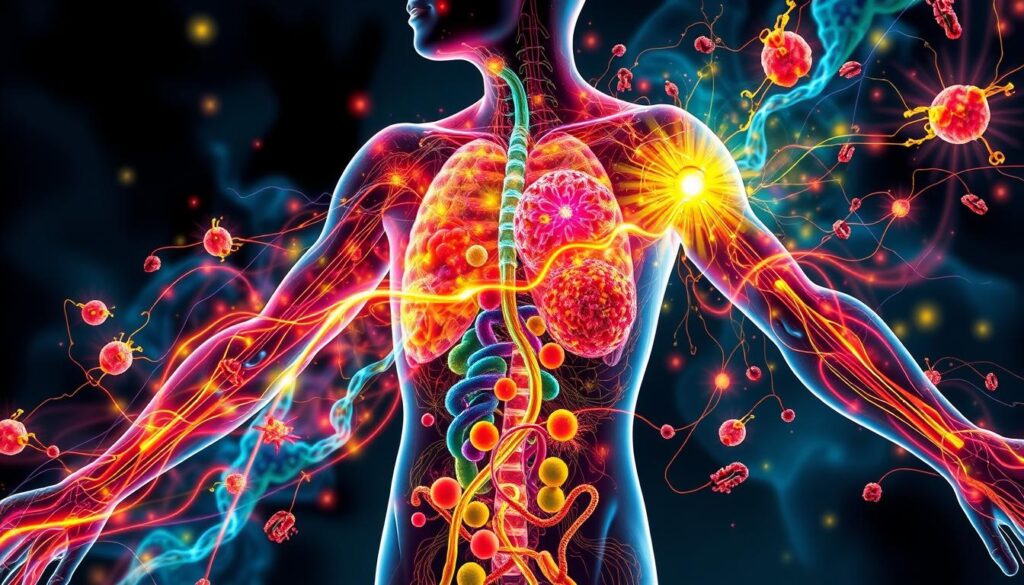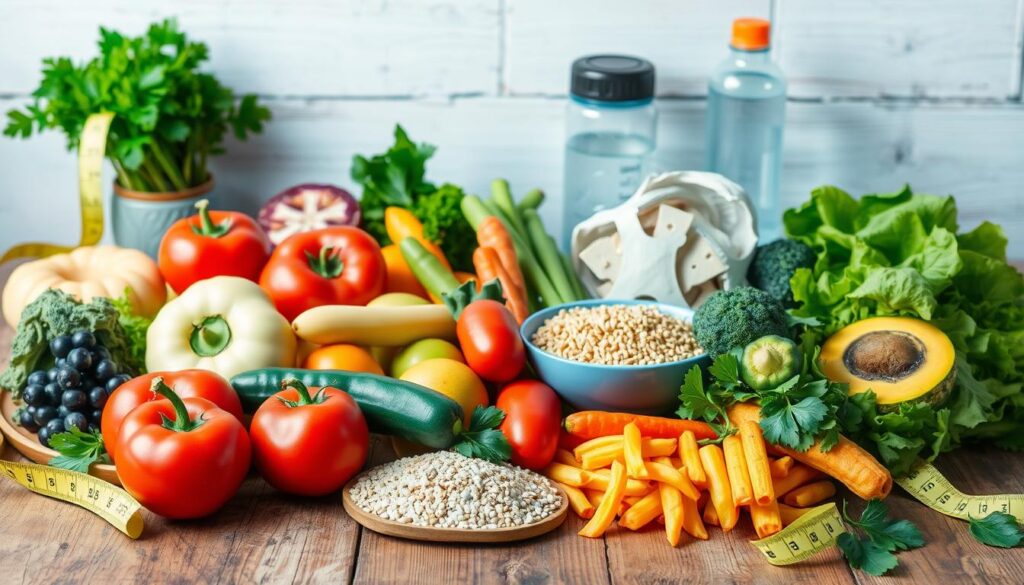Are you tired of trying diet after diet, only to feel frustrated and no closer to your goals? You’re not alone. Many popular diets don’t deliver the results they promise. But, there’s a better way to lose weight and keep it off without restrictive measures.
In this guide, we’ll explore the science of effective, long-term weight loss. We’ll look at the metabolic and hormonal factors that affect weight loss. And, we’ll share the key principles of successful weight loss plans. Say goodbye to yo-yo dieting and hello to a healthier, happier you.
Key Takeaways
- Discover the science-backed strategies for sustainable weight loss
- Learn how to create a calorie deficit without starving yourself
- Understand the power of portion control and mindful eating
- Explore the benefits of intermittent fasting and low-carb diets
- Unlock the role of protein in weight management and muscle preservation
Understanding the Science Behind Sustainable Weight Loss
Getting to a sustainable weight loss isn’t just about cutting calories or following the latest diet trends. It’s a complex process that involves understanding your metabolism and hormones. Let’s explore how your body works and find the keys to long-term weight management success.
Metabolic Processes and Weight Management
Your metabolism is like the engine of your body, deciding how fast you burn calories. Boosting your metabolism can change the game for losing weight and keeping it off. Your age, muscle mass, and how active you are all affect your metabolic rate. By adding metabolism boosters to your life, you can increase your calorie burn and support your weight loss journey.
The Role of Hormones in Weight Control
Hormones are like chemical messengers in your body, controlling many functions, including your weight. Imbalances in hormones like insulin, thyroid, and cortisol can greatly affect your ability to maintain a healthy calorie deficit. It’s important to understand how these hormones affect your hunger, metabolism, and fat storage. This knowledge is key to achieving a hormonal balance that supports your weight loss goals.
| Hormone | Role in Weight Management |
|---|---|
| Insulin | Regulates blood sugar levels and influences fat storage |
| Thyroid | Controls the body’s metabolism and energy expenditure |
| Cortisol | Manages the body’s stress response and can lead to weight gain |
By grasping the complex relationship between your metabolism and hormones, you’ll be ready to create a sustainable weight loss plan. This plan will work for your unique body and lifestyle.

“Sustainable weight loss is not just about short-term fixes, but rather a holistic approach that addresses the underlying physiological factors.”
Weight Loss Diet: Essential Principles for Success
Long-term weight loss isn’t just about following the latest diet trends. It’s about adopting healthy eating habits and mindful nutrition that you can keep up with for a long time. The secret to a successful weight loss diet is understanding the key principles that lead to lasting change.
First, focus on a balanced nutrition plan. Make sure your meals have a variety of foods like lean proteins, whole grains, fruits, and veggies. Balanced nutrition helps with weight loss and keeps you healthy overall.
Also, mindful eating is key to success. It means eating with full attention, enjoying each bite, and listening to your body’s hunger and fullness signals. Mindful eating helps you avoid eating without thinking and makes you more aware of your food choices.
- Set up a healthy eating routine that fits your life
- Use portion control to keep calorie intake in check
- Add nutrient-dense, whole foods to your meals
- Build sustainable habits that you can keep up with long-term
Remember, lasting weight loss isn’t about quick fixes or cutting out food. It’s about building a positive, balanced relationship with food and your body. By following these essential principles, you’ll be on your way to lasting, healthy results.

“The foundation of a successful weight loss journey lies in adopting a balanced, mindful approach to nutrition.”
Creating a Calorie Deficit Without Starving Yourself
The secret to lasting weight loss is a calorie deficit. This means burning more calories than you eat. You don’t need to starve or go extreme to see results. Achieving a calorie deficit is simple and doable when you understand the basics.
Calculating Your Daily Caloric Needs
To start, figure out your daily calorie needs. Use an online calculator or a simple formula. It considers your age, gender, activity level, and weight. Knowing your daily calorie needs helps you make small changes for a sustainable calorie deficit.
Smart Ways to Reduce Calories
- Use smaller plates and measure food to control portions.
- Choose nutrient-rich foods over high-calorie ones, like water instead of sugary drinks.
- Keep track of what you eat to stay aware of calorie intake.
Tracking Methods That Work
Tracking your progress is key to a consistent calorie deficit. There are many ways to do this, from food journals to apps. Try different methods to find what fits your life best.
| Tracking Method | Pros | Cons |
|---|---|---|
| Food Journal | Increases mindfulness, easy to use | Time-consuming, might underreport |
| Calorie Counting App | Handy, gives detailed info | Needs regular use, can be tedious |
| Wearable Fitness Tracker | Tracks calories in and out | Accuracy can vary, costs extra |
Success in a calorie deficit comes from finding a method you can stick with. With some trial and error, and a focus on portion control and food tracking, you can reach your weight loss goals without feeling deprived.
The Power of Portion Control and Mindful Eating
Weight loss isn’t just about cutting calories. It’s about building healthy eating habits for the long run. Portion control and mindful eating are key strategies.
Portion control means managing how much food you eat at each meal. It helps you eat less without feeling hungry. Using smaller plates can make you feel full with less food.
- Learn the standard serving sizes for different foods.
- Use measuring cups and spoons to measure your portions.
- Eat slowly and enjoy each bite to know when you’re full.
Mindful eating means paying attention to your meals. It helps you listen to your body’s hunger and fullness signals. This way, you avoid eating out of emotional reasons.
- Turn off TVs, computers, and phones while eating.
- Pause before eating to check if you’re really hungry.
- Chew slowly and enjoy the taste and texture of your food.
Mastering portion control and mindful eating helps you lose weight and develop a better relationship with food. These habits let you make smart choices, leading to a lasting and rewarding weight loss journey.
| Portion Size | Calorie Count |
|---|---|
| Small Apple | 80 calories |
| Medium Banana | 105 calories |
| 1/2 Cup Cooked Rice | 100 calories |
| 3 oz Grilled Chicken Breast | 160 calories |
The key to successful weight loss is not deprivation, but rather learning to make mindful choices that nourish your body and satisfy your cravings.”
By using portion control and mindful eating, you can eat less without feeling like you’re emotional eating. These strategies can change your weight loss journey.
Intermittent Fasting: A Time-Based Approach to Weight Loss
Are you curious about intermittent fasting? This method has become popular for weight loss. It involves alternating between eating and fasting. This can greatly improve your metabolic health. Let’s look at different fasting protocols and how they can help you lose weight.
Different Fasting Protocols
Intermittent fasting offers flexibility. You can choose a protocol that fits your lifestyle. Here are some common ones:
- 16/8 Method: Fast for 16 hours and eat in an 8-hour window.
- 24-Hour Fasts: Fast for 24 hours, one or two times a week.
- Alternate-Day Fasting: Alternate between fasting and eating every other day.
- The 5:2 Diet: Eat normally for 5 days and limit calories to 500-600 on the other 2 days.
Benefits Beyond Weight Loss
Intermittent fasting offers more than just weight loss. It can also:
- Improve insulin sensitivity and lower type 2 diabetes risk.
- Boost brain function and health.
- Reduce inflammation and oxidative stress.
- Enhance cellular repair and regeneration.
- Possibly extend lifespan and slow aging.
By giving your body breaks from constant eating, intermittent fasting unlocks many benefits. It’s a flexible way to improve your health and well-being.
Low-Carb Diet Strategies for Effective Fat Loss
Low-carb diets are popular for losing weight. They cut down on carbs, helping your body burn fat better. You can choose from a few low-carb plans, like a moderate carb limit or a strict ketogenic diet.
Exploring the Ketogenic Diet
The ketogenic diet is well-known. It limits carbs to under 50 grams a day. This puts your body in ketosis, where it burns fat instead of carbs. It leads to fat loss and better health.
Balancing Carb Cycling
Carb cycling is a gentler low-carb option. It switches between low-carb and higher-carb days. This way, you enjoy carbs sometimes but still lose fat.
- Low-carb diets can be highly effective for fat loss
- The ketogenic diet is a popular low-carb approach that induces fat-burning ketosis
- Carb cycling offers a more balanced approach, alternating between low and higher-carb days
Choosing the right low-carb diet is crucial for lasting weight loss. By trying different methods, you can find what works best for you.
“Embracing a low-carb lifestyle has been a game-changer for my weight loss journey. The results have been incredible, and I feel better than ever.”
Protein’s Role in Weight Management and Muscle Preservation
Protein is a key player in weight loss. It helps keep your lean muscle and makes you feel full and satiated. Knowing the best sources and when to eat protein can boost its benefits.
Optimal Protein Sources
For weight management, choose high-quality protein foods. Go for lean meats, fish, eggs, legumes, Greek yogurt, and cottage cheese. These foods are not only nutritious but also keep you full, helping you control calories and build lean muscle.
Timing Your Protein Intake
Timing your protein intake is important for weight and muscle health. Eat protein-rich foods at every meal and snack, especially after workouts. This supports muscle recovery, growth, and keeps you feeling full and satiated.
By focusing on protein-rich foods and timing, you’ll achieve your weight loss goals and keep your lean muscle.
“Protein is the building block of muscle, and maintaining muscle mass is crucial for weight management and overall health.”
| Protein Source | Protein Content (per serving) |
|---|---|
| Grilled Chicken Breast | 54 grams |
| Salmon Fillet | 34 grams |
| Greek Yogurt | 23 grams |
| Lentils | 18 grams |
| Eggs (2 large) | 12 grams |
Strategic Meal Planning for Weight Loss Success
Weight loss isn’t just about cutting calories. It’s also about eating balanced meals that keep you full. Learning to meal plan and meal prep is key to lasting success.
Finding the right mix of healthy foods and your favorite dishes is crucial. Start by picking your go-to healthy ingredients. This makes it easier to stay on track and get the nutrients you need.
- Include lean proteins, complex carbs, and fruits and veggies in your meals.
- Make sure your meals have the right portion sizes to help you lose weight without feeling hungry.
- Prep parts of your meals ahead of time to save time and make healthy eating easier.
It’s also important to listen to your body’s hunger and fullness signals. Eat mindfully, enjoying each bite and noticing how foods affect you. This helps you find the right portion sizes and make better choices.
Meal planning is the key to unlocking a healthier lifestyle and sustainable weight loss. With a little preparation, you can enjoy delicious, balanced meals that fuel your body and support your goals.”
By using meal planning and meal prep, you’re on the path to reaching your weight loss goals. It’s not about being perfect; it’s about making progress. Start small, try new recipes, and find what works for you.
Using the Food Scan Genius App for Diet Success
Discover the Food Scan Genius app to change your weight loss journey! This tool gives you key nutritional info right on your phone. Just scan a food barcode to see its calories, nutrients, and allergens.
Maximizing App Features for Weight Loss
The Food Scan Genius app is your best friend for losing weight. Use its barcode scanner to check food before buying. This helps you keep your calorie and nutrient goals in check.
The app also has a big database of foods. This makes it easy to track what you eat every day.
Making Informed Food Choices
With the Food Scan Genius app, you can choose better foods for losing weight. Find out which foods are high in calories or sugar. Then, pick healthier options that fit your diet.
The app also tracks allergens. This helps you avoid foods that might cause problems. It makes losing weight easier and stress-free.
FAQ
What is the most effective weight loss diet?
There’s no single “best” diet for everyone. It depends on your body and lifestyle. Our guide offers science-backed tips to find what works for you.
How do I boost my metabolism for weight loss?
Boosting your metabolism involves several steps. These include building muscle, staying hydrated, and getting enough sleep. We’ll share tips on metabolism-boosting foods and exercises.
Can hormones affect my weight?
Yes, hormones play a big role in weight management. Hormonal imbalances can affect your weight loss efforts. We’ll explore how to balance your hormones for better weight control.
How do I create a calorie deficit for weight loss?
A calorie deficit is key for losing weight. We’ll teach you how to calculate your daily calories and share ways to cut calories without feeling hungry. We’ll also cover tracking methods to stay on track.
What is the role of portion control in weight loss?
Portion control is crucial for managing your weight. We’ll show you how to control your portions and listen to your body’s hunger signals. This will help you make better food choices.
How does intermittent fasting work for weight loss?
Intermittent fasting is a time-based eating method that can help with weight loss. We’ll explain different fasting methods and their benefits, like better metabolic health.
Are low-carb diets good for fat loss?
Low-carb diets can help with fat loss by promoting fat burning. We’ll discuss different low-carb diets and help you find the right one for you.
How much protein do I need for weight loss?
Protein is important for weight management. It helps keep muscle and makes you feel full. We’ll share tips on protein sources and timing for weight loss.
How can meal planning help with weight loss?
Meal planning is a game-changer for weight loss. We’ll give you tips for healthy meals and meal prep to make eating healthy easy.
How can the Food Scan Genius app help with my diet?
The Food Scan Genius app can change your diet game. It gives you quick access to food info. We’ll show you how to use it to make better food choices and track your diet.





